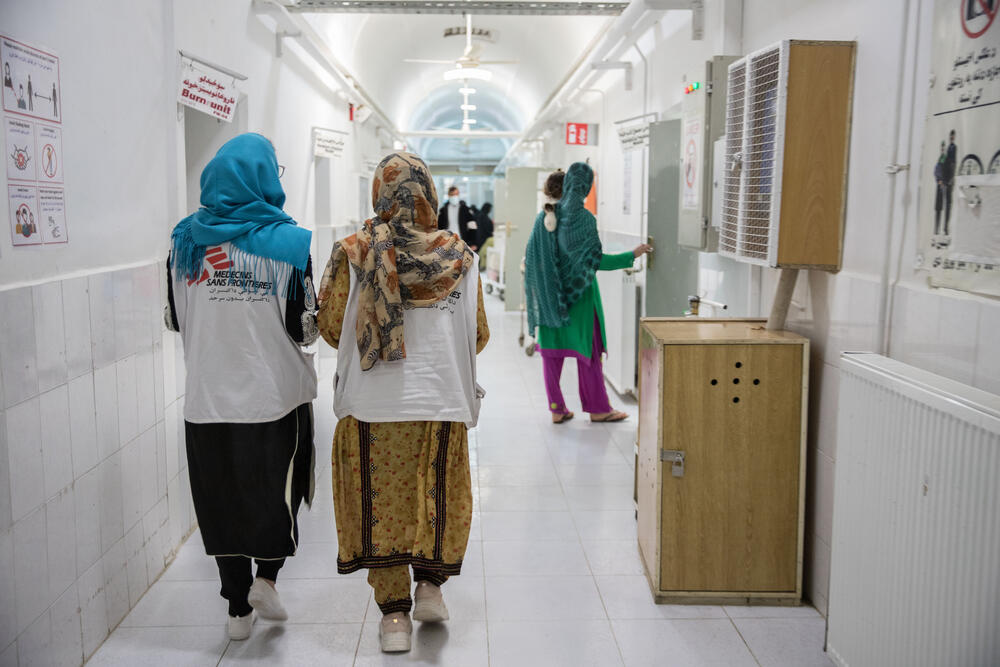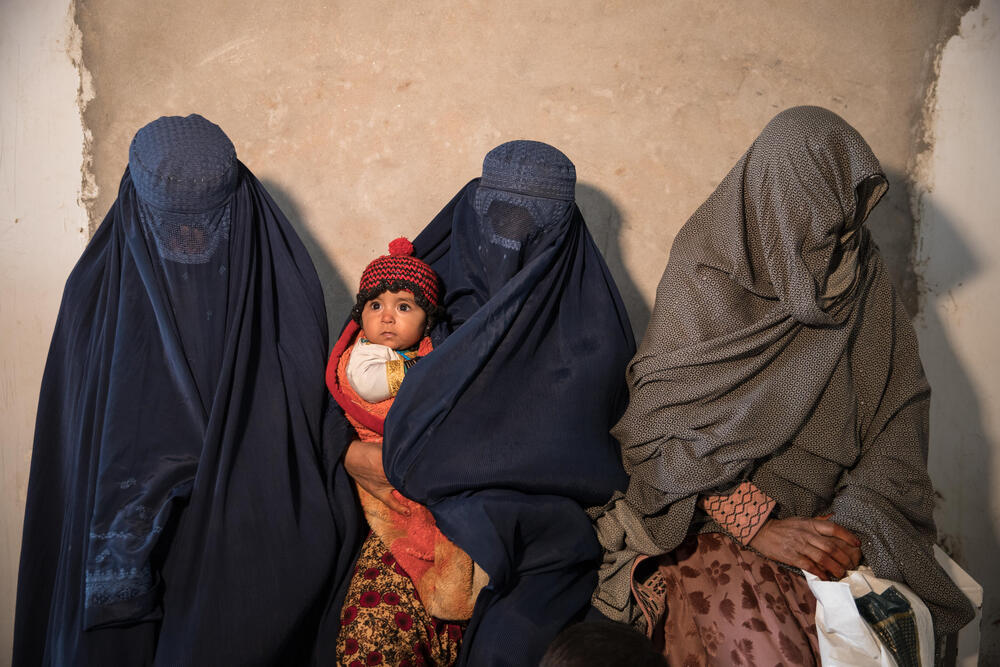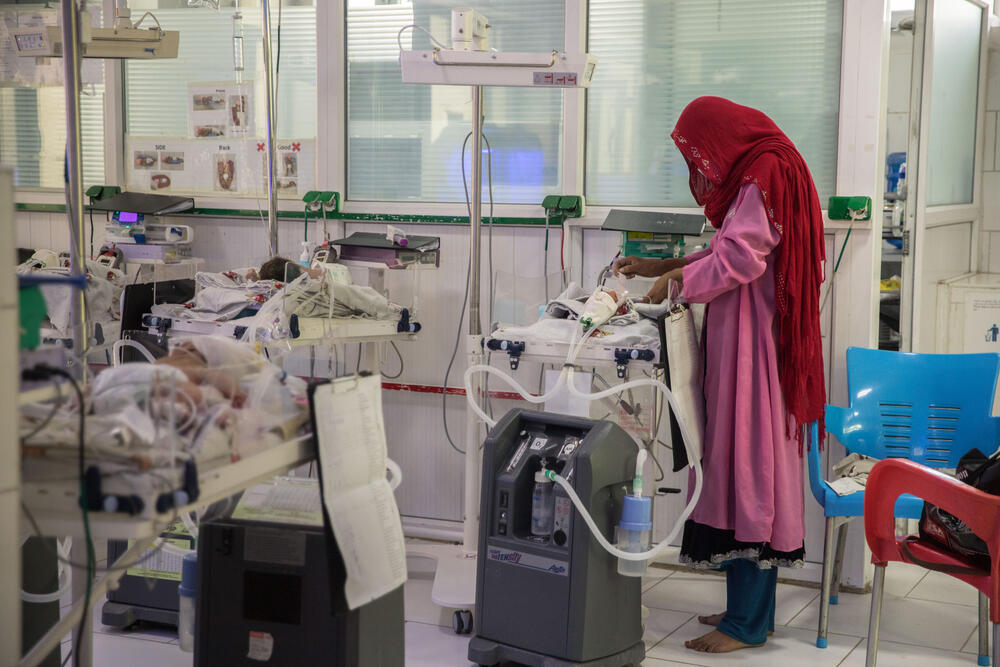Afghanistan: “It is difficult to know that we are something less”
In Afghanistan, the future of female patients and healthcare workers is under threat following a decree prohibiting women from working for non-governmental organisations (NGOs).
The announcement was made by the Ministry of Economy on 24 December.
Soon after, Médecins Sans Frontières / Doctors Without Borders (MSF) condemned the decision by the Islamic Emirate in a press release on 29 December.
“This ban will not affect just women. It will affect the country.”
Though health workers, including MSF staff, are currently exempted from the ban, there is no formal assurance that they will be able to continue to work unhindered.
In a country with a high dependency on humanitarian and non-governmental support, the participation of female NGO workers in the provision of healthcare services is an absolute necessity.
For MSF, women make up more than 51 percent of our medical staff in Afghanistan.
Life-saving medical care, thanks to your support
The generosity of people like you means expert MSF teams save lives in more than 90 countries worldwide. In conflict zones, natural disasters and epidemics, we go where we are needed greatest.
Women treating Women
Following the announcement, some of MSF’s female staff in Afghanistan have now voiced their fears for the future and shared their frustration. Their names have been changed to protect their identity.
“In the hospital, we have lots of patients who are women,” says Farzaneh, an Afghan MSF staff member.
“When they fall sick or need to deliver a child, they must have a place to go. If the Taliban prevents female staff from working, no one will be able to take care of them.
“A woman’s health affects the health of her whole family: if there is no access to pre-natal and post-natal services, children’s lives will be put at risk as well. This ban will not affect just women. It will affect the country.”
Another MSF staff member says: “If this ban is extended to health workers, then things will be very difficult for female patients as well."
“Many families will not accept women being treated by men. All of this can harm Afghan women in several ways, including by an increase in maternal and infant mortality.”
Economic impact
As well as exacerbating the issue of access to humanitarian aid, the Islamic Emirate’s ban compounds a dire social and economic situation.
The country has been crippled by unemployment and sanctions imposed by foreign governments – particularly by the US administration, which still controls many of the funds of the Afghan Central Bank.
“I would like to say one thing: please do not forget the women in Afghanistan"
“There are seven people in my family that I provide for. If I become unemployed, no one will be able to support the family”, says MSF Afghanistan staff member, Benesh.
“Many women in Afghanistan are the breadwinners for their families because the men are unable to work, have fled the country or have died.
“Every day I think a lot about what I would do if I were not allowed to work anymore.”
Vulnerable groups
Women and children are among the most vulnerable groups in Afghanistan, and the concerns raised by MSF's female staff echo those of other Afghan women.
“The recent ban has already caused psychological problems for many women and their families. We fear that every day at work can be our last,” says Soraya, another MSF staff member.
“Getting to offices seems more and more difficult. Already I see that the people at checkpoints look for any excuse to prevent women from moving freely.
“For example, my sister was sick recently, and, when she was travelling to our hospital for a check-up, they did not allow her to go because she didn’t have a mahram (escort). She stood there for about 50 minutes, outside in the cold.
“Then my brother came, and they allowed them to leave. It is difficult to know that we are something less.”
Lastly, Soraya shares a request:
“I would also like to say one thing to people who might be reading this: please do not forget the women in Afghanistan.
“No society can do well without both women and men. We all need to be involved in our communities to make things better.”
MSF in Afghanistan
Decades of conflict have ruined Afghanistan’s economy and infrastructure, and many people rely on humanitarian aid.
Médecins Sans Frontières/Doctors Without Borders (MSF) provides emergency, paediatric and maternal healthcare in Afghanistan, which has one of the highest maternal mortality rates in the world.
Our teams continued to provide medical aid throughout the crisis following Afghanistan's change of government in 2021. We treated emergency trauma cases, supported people with chronic conditions and worked to welcome new life with vital maternity services.


